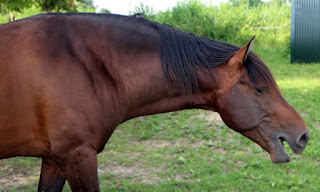Selena Gomez, Katy Perry, Rihanna Score 2011 Teen Choice ...
Warning To Horse Owners Over Equine Flu
HORSE owners in North Yorkshire have been urged to be on red alert after an outbreak of equine influenza.
There have been four reported cases of horse flu in the UK since January 2, among unvaccinated horses, and Minster Veterinary Equine Clinic in York has urged owners to ensure their horses or ponies are vaccinated.
The British horse racing industry is currently on red alert over the outbreak, as the airborne infection can spread easily, making it hard to contain,with symptoms including nasal discharge, a dry cough, high temperature and a loss of appetite.
The four cases so far have occurred in Lincolnshire, Cheshire, Derbyshire and Essex, but to help tackle the outbreak, Minster Equine Clinic's practices in Poppleton and Ripon are offering owners who have lapsed in their vaccination regime one of the three necessary vaccinations for free.
Gemma Dransfield, clinical director, said: "Horses that are not vaccinated are at serious risk if they come into direct contact with a horse suffering from the condition.
"However, there is also an indirect risk. Many owners say they don't have their horse vaccinated because they don't take it away to shows or competition, but if a horse shares a stable yard with other horses that are taken away, then there is a risk. The condition is airborne and can travel up to 50 metres and horses with underlying condition like immune problems or respiratory issues are more susceptible. We don't want to panic people, but owners should protect their horses by vaccinating against flu, keeping vaccinations up to date and ensuring their horses have their annual booster. Racehorse trainers are being advised to give a twice-yearly booster."
Horse owners are also urged to contact their vet if they suspect their horse is suffering from flu or there is a suspected outbreak on their yard.
Horses Not Vaccinated For Equine Flu May Not Be Insured Against The Virus
Horse owners are being urged to consider getting their animals vaccinated against equine flu even if they do not race.
Equine insurance expert Richard Freeman, of Lycetts Picture: SUBMITTED (Image: SUBMITTED)
Richard Freeman, of equine insurance broker Lycetts, is warning that their horses may not be insured against the virus if they are not vaccinated and become infected.
This follows The British Horseracing Authority (BHA) announcement that racing will not resume until Wednesday, February 13, at the earliest, including fixtures scheduled by the Point-to-Point Authority.
The BHA called off all four horse racing meeting fixtures due to take place on Thursday, February 7, after three vaccinated horses tested positive for equine flu, which is highly contagious.
This is the latest in a series of outbreaks of the disease in 2019 – with others reported in Essex, Cheshire, Derbyshire, Lincolnshire, Yorkshire and Suffolk.
All British racehorses are vaccinated against equine flu, but it is not compulsory for the wider horse population to be vaccinated against the disease.
Equine insurance expert Mr Freeman, who is based at Lycetts Newmarket office, urged owners of horses that do not race to consider vaccinating their animals, if they haven't already done so.
He also said racehorse trainers should follow BHA advice to give horses who haven't had a vaccination in the past six months a booster and follow precautionary measures.
"Horse owners should contact their broker to check what the terms of their policy are and see what protection it offers," he said.
"Equine flu is generally not specifically excluded from equine insurance cover, but it is commonly a condition of a policy that the insured horse must be vaccinated against equine flu.
"It is always the case that the insured must at all times provide proper care and attention to the insured horse and do all things possible to minimise any loss."
This strain of equine flu has affected vaccinated horses, although symptoms are usually more mild than in unvaccinated horses and include a raised temperature, a cough and nasal discharge.
Mr Freeman said: "This is a serious situation for all horse owners, who wait with bated breath to see what the full impact of this disease will be."
To prevent the spread of horse flu the League Against Cruel Sports is urging over 200 hunts to stop immediately.
A spokesman said many horses involved in racing also take part in hunting and this disease spreads easily in horses and "can even jump across to the hunting hounds".
Chris Luffingham, director of campaigns at the League Against Cruel Sports, said: "There is a serious risk of horse flu spreading among both horses and hounds if they continue meeting up
"It would be grossly irresponsible of the hunts to ignore the precedent being set by the horse racing authorities."
Equine Flu
Equine flu - Horse & Hound{"piano":{"sandbox":"false","aid":"u28R38WdMo","rid":"R7EKS5F","offerId":"OF3HQTHR122A","offerTemplateId":"OTQ347EHGCHM"}}
Horse & Hound's definitive guide to equine vaccinations
Equine flu: what all owners need to know to protect their horses
Disease experts call for 'vital' return to six-monthly flu jabs for horses
Equine flu vaccination shortage remedied – as multiple outbreaks occur
Competition horses' six-month flu boosters out owing to vaccine shortage
Equine flu vaccination deferrals advised as vaccine shortage affects UK first
'We're trying to make sure everyone's protected': experts working on equine flu vaccination shortage
We all have a role in preventing spread of equine disease: new guide released
The aim was to help riding schools struggling with no income during lockdown
The amnesty on six-month boosters, announced in July, was given by two of the sports' governing bodies in order for members to bring their vaccinations up to date
Governing bodies have provided clarification on flu vaccination requirements as more sport gets underway
Equine flu vaccinations reminder one year after major outbreak
If you teach visiting clients and their horses on your premises, are you opening the door to infectious disease? Andrea Oakes investigates
Official figures indicate that for every 10,000 vaccines administered, around five horses have a severe reaction, so one governing body has introduced an exemption for extreme cases
'We take this very seriously indeed and every case will be looked at according to the application'
How can we keep infectious disease at bay? We outline how yard practices and routines contribute to biosecurity
'We appreciate this is a significant move, so we wanted to ensure that we considered the advice provided by veterinary experts before amending our rules'
'We have left it up to the owners to make the decision whether they come to the show or not'
{"location":"Keystone Header","subscribeText":"Subscribe now","version":"1","menuWidgetTitle":"","myAccountLnk":"\/my-account","premiumLnk":"\/join","menuLnks":[],"colors":{"text":"#000","button":"#000","link":"#00643f"}}



Comments
Post a Comment